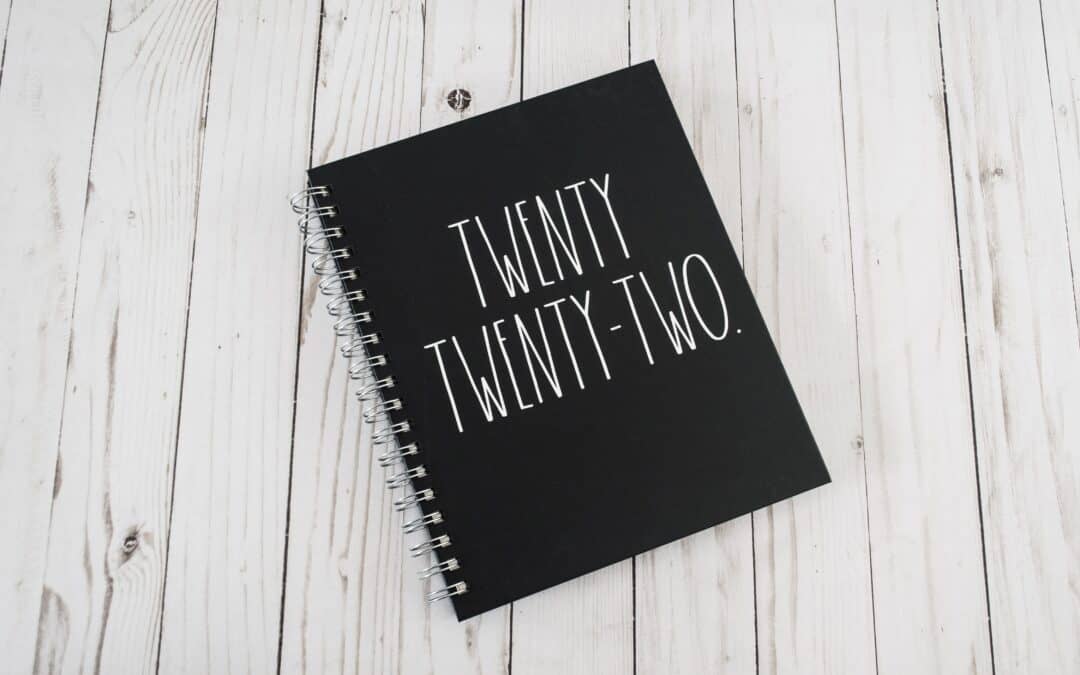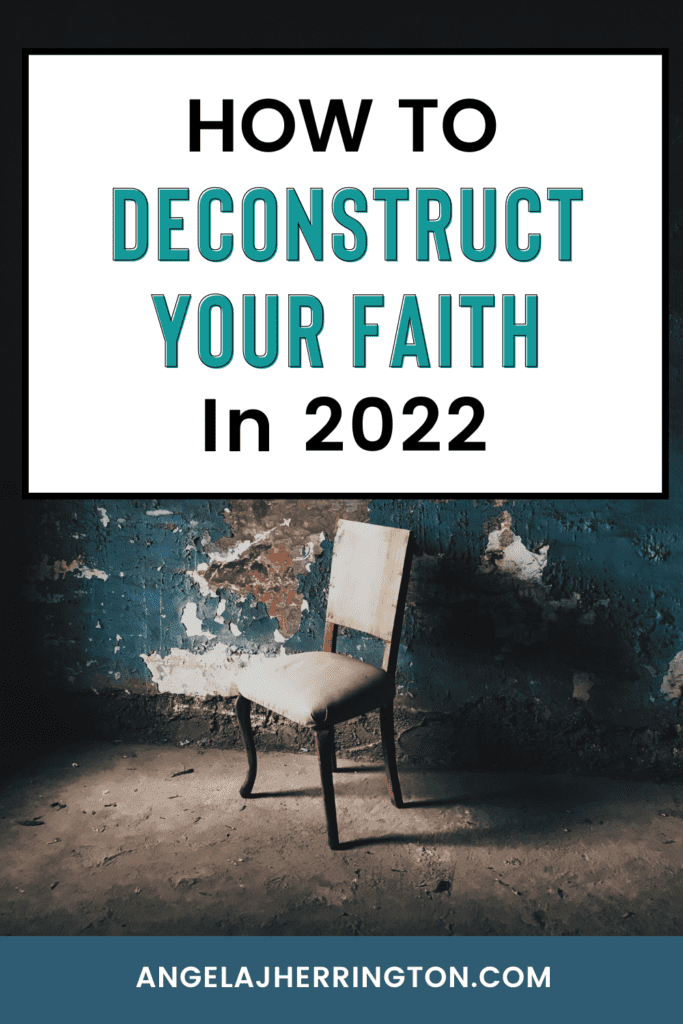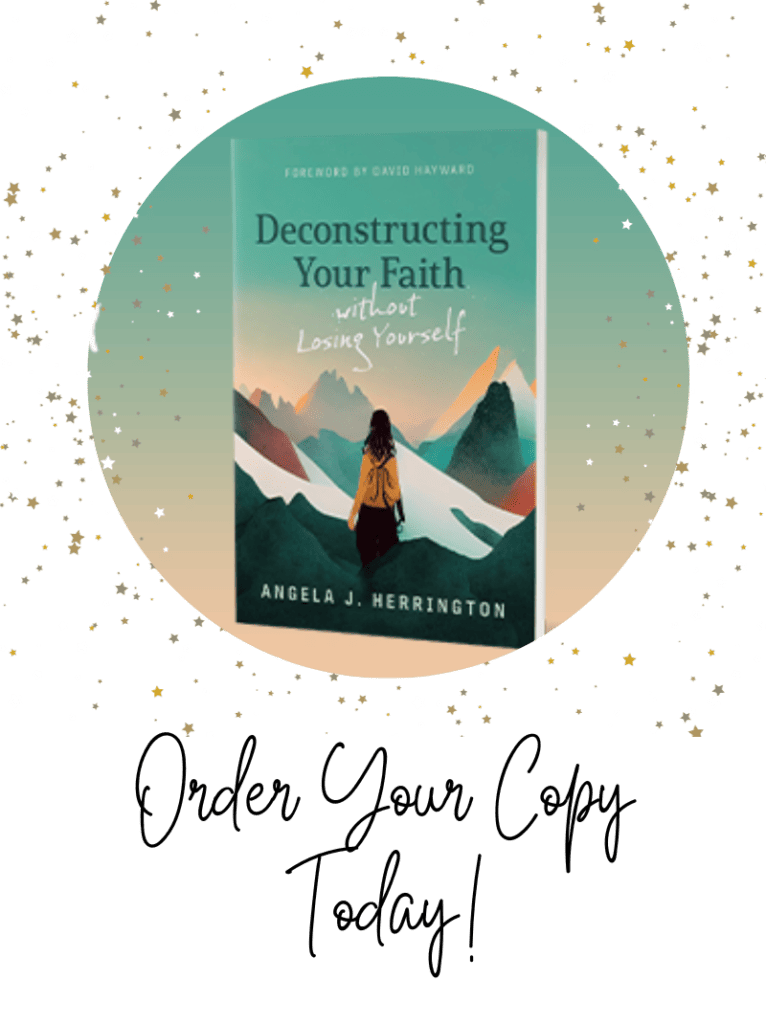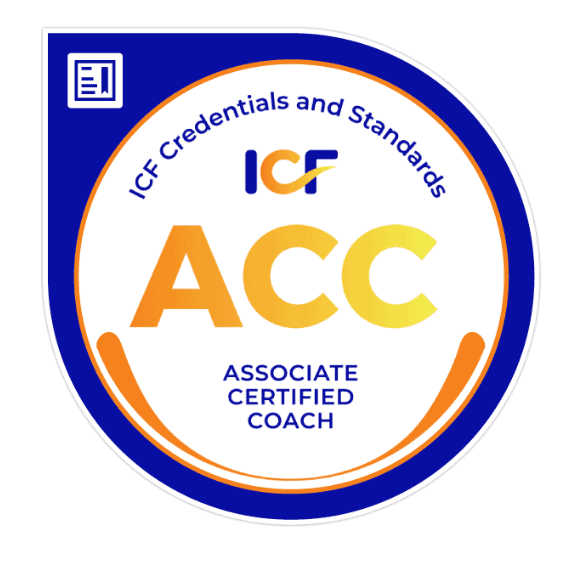It’s the end of the year and you know what that means— It’s list-making time!
Everyone seems to love a good list that reflects on last year or helps us get organized for the coming year. So I’ve decided to put together a list of ways to help you navigate faith deconstruction without getting overwhelmed or stuck.
How to Deconstruct Your Faith in 2022 is my list of 10 simple ways to invest in faith deconstruction over the next 12 months.
- Get a GOOD therapist who’s not worried about making sure you stay Christian.
Christian counseling isn’t known for being the healthiest industry out there. Find a therapist who doesn’t prioritize your salvation over healthy boundaries, autonomy, and healing from trauma. If your counselor, therapist, or pastor is deeply entrenched in the toxic system you’re trying to break free from, they can actually do more harm than good. Trauma recovery (which is a huge part of deconstructing your faith) requires a skilled, objective therapist. - Set better boundaries on your socials.
Yes, it’s important to hear other perspectives, but it’s also good to have safe spaces to engage with people who aren’t going to throw toxic beliefs at you. Social media is your virtual living room and it’s time to block, hide, remove, unfollow anyone who is abusive, gaslighting, or using shame to ‘motivate’ people to find God. Don’t know where to start? Trust your gut and start with anyone who regularly triggers that knot in your stomach. Checkout this article I wrote about maintaining boundaries online: https://angelajherrington.com/how-to-handle-online-bullies-while-deconstructing-your-faith/ - Bring in a few fresh voices to help you see things you don’t see right now.
Now that you’ve cleaned out some of the unhealthy voices, it’s time to bring in new ones to empower, educate, and encourage you while you’re deconstructing faith. Subscribe to a couple of newsletters from bloggers who help you ask hard questions about faith deconstruction. Follow a couple of new people on social media who are deep in this space and coming from a place of curiosity and hope. (Be careful that the newsfeed doesn’t fill up with negative commentary, name-calling, and manipulative rhetoric. Keep those healthy boundaries!) I put together a list of the Best Books on Deconstructing Your Faith, which is a great place to start finding new perspectives!
- Find an inner circle that can hold space for you without pushing their own agenda.
Along the same lines as #2, you need an inner circle of confidants you can talk with about the hard stuff. Some conversations just aren’t meant for public consumption and without trusted friends, things get messy. These friends don’t have to be experts who have all the answers, but they do need to know how to listen and hold things in confidence. If you need a hand finding like-minded people, I’d love to have you join my free group, The Faith Deconstruction Café. And keep an eye out for an opportunity to join the Deconstructing Your Faith Group Coaching Cohorts I’ll be offering three times a year, too. - Choose to nourish yourself before your tank hits empty.
Faith deconstruction can be draining. Who am I kidding? Life, in general, can be draining and one of the things toxic religion doesn’t teach us is how to care for ourselves. Reclaiming a healthy spirituality will require you to learn what comforts you on hard days and make sure you have access to it on the regular days. What helps you recenter? Candles or oils with a special scent? Yoga? Getting a massage? Sitting in silence? Taking a nap? Whatever it is, build it into your routine to help you become more resilient and less likely to burn out.
- Commit to a routine of gentle movement and deep breathing.
I know. I just gave you two tips in a row related to caring for yourself, which you probably don’t love to do, but it really is key to deconstructing your faith. As you challenge and question all your beliefs, you’re going to be releasing some deep stuff. Help your body process all those feelings by regularly moving and breathing. Your routines don’t have to be fancy or expensive; deep breathing while gently stretching is a great place to start. There are several apps you can download to your phone to teach you how to support your body with breathwork, meditation, and gentle movement.
- Learn how to say nice things to yourself.
Most of us are out here getting our arses kicked by people who just don’t understand how deconstructing your faith is a GOOD THING. So you need to be your biggest cheerleader and learn how to speak kindly to yourself. The first thing to stop is all the negative things you say about yourself (aloud and silently). Putting yourself down isn’t funny, it’s a product of harmful conditioning from people who wanted you to feel small. Instead of minimizing your worth or impact with dismissive self-talk, start with being grateful for yourself. Thank your body for carrying you to this point (no matter what she looks like or how many battle scars she carries for you).
- Connect with a coach who specializes in deconstruction.
Yes, hire a faith deconstruction coach in addition to the therapist I told you to find in #1. Why both? Having a therapist and coach in your corner is going to feel supportive because they play different roles in your healing. Therapists focus on treating mental health conditions like depression, anxiety, and helping you recover from trauma (which many of us need during deconstruction). Faith deconstruction coaching focuses on developing new habits and carving out a new spiritual pathway that isn’t tangled up in toxic religion. Hire a faith deconstruction coach and they’ll show you how to deconstruct your faith in 2022 without getting lost in overwhelm and isolation. Don’t have a coach? Find out more about working with me here.
- Give yourself permission not to have it all figured out.
Faith deconstruction is a process, not a box you can check off in your planner. It’s going to take a significant amount of time to untangle yourself from the harmful doctrines of toxic religion. Give yourself permission to take your time and not know all the answers right away. Most people who’ve been deconstructing for a long time will tell you that we never really get to know all the answers. Allow yourself to learn as you go. Releasing yourself from the pressure of always being certain is going to save you a lot of energy and frustration.
- Trust the process enough to sit with open hands.
Is it possible to lose ones faith, family, and friends because you want to deconstruct your faith? YUP. Is this the most likely outcome? Nope-Not at all. Most people who come into faith deconstruction looking for a way to hold on to God without staying in abusive, unhealthy faith communities succeed, but early on they came to terms with the fact that trying to control the outcome, trying to guarantee that they’d still be Christian at the end of it all, wasn’t going to work. You can’t get to a healthier spiritual life if your hands are tightly clenched around your old belief system. Learn to loosen your grip and choose to believe that deconstructing your faith can help you find the truth.
You deserve to be free from unhealthy doctrines, abuse, and #churchhurt. It’s my hope this will be the year you untangle yourself from toxic religion, once and for all, using this guide on how to deconstruct your faith in 2022!
Still not sure if deconstruction is right for you?
Click here to grab your copy of my free workshop, Is Deconstruction Right for You?

Angela is a Faith Deconstruction Coach and host of The Deconstructing Faith Summit who helps people break free from toxic religious culture & empowers them to recover from #churchhurt. She has led online ministries for a decade, enjoys working with clients 1:1, in groups, and is a dynamic conference speaker. She’s a Lark’s Song Certified Life Coach who reaches thousands of people in 40+ countries each month on Facebook, IG, Twitter, Pinterest, and her blog.
She’s a firstborn, Enneagram 8, Gen Xer who loves to question everything. She holds a BA from Indiana Wesleyan and a Masters in Leadership from Wesley Seminary. Her graduate research project focused on leadership development and opportunities for Gen X women in the US church.
Angela and her unique online ministry are featured in Lyz Lenz’s 2019 book God Land: Story of Faith, Loss, and Renewal in Middle America. She has published articles in Hope for Women and HOPE is Now magazines. She has been featured in The New Republic, Publisher’s Today, and Religion News Service.
Her first book, Deconstructing Your Faith Without Losing Yourself, Will be published by Eerdmans in February 2023.
Angela is also a wife, mom to 5, and a proud resident of Marion, Indiana with her family when they’re not traveling the US in their RV.








